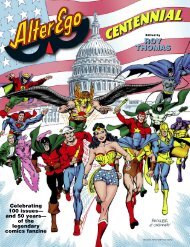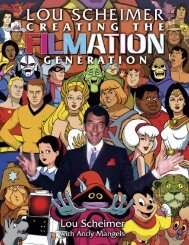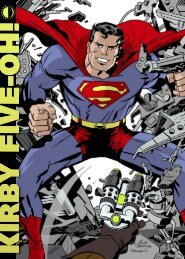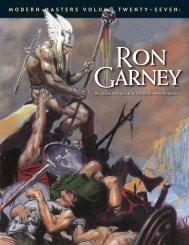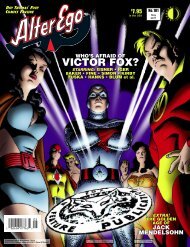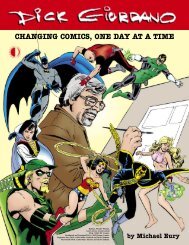JENETTE KAHN - TwoMorrows Publishing Store
JENETTE KAHN - TwoMorrows Publishing Store
JENETTE KAHN - TwoMorrows Publishing Store
You also want an ePaper? Increase the reach of your titles
YUMPU automatically turns print PDFs into web optimized ePapers that Google loves.
Burton’s Bat-Cast<br />
(above) Jenette admits to an initial resistance to the casting<br />
of Michael Keaton as Batman, but now regards him as her<br />
favorite of the movie Batmen. Jack Nicholson and Michael<br />
Keaton in a publicity still from director Tim Burton’s Batman.<br />
(right) John Wesley Shipp as TV’s Flash.<br />
TM & © DC Comics.<br />
<strong>KAHN</strong>: It was tremendously frustrating, because those of us who<br />
were involved with comics understood that they lent themselves to<br />
totally engrossing, thrilling, and entertaining movies. Yet despite the<br />
record-making successes of the Superman and Batman movies, Warner<br />
Bros. was not persuaded to move on our other characters. There was a<br />
lot of development, but I don’t think that the execs at Warner Bros. had<br />
confidence in comics or in the characters that sprang from them.<br />
And it wasn’t really until Marvel started making movies, and some of<br />
them quite exceptional superhero movies, that Warner Bros. realized<br />
it was sitting on a treasure trove.<br />
GREENBERGER: Right. Now the other success, thanks to Tim Burton<br />
and Batman, was, of course, in the early ’90s, the Flash show on CBS.<br />
This really seemed to get Les Moonves and the people over at CBS kind<br />
of excited about this stuff, because I remember you had editorial<br />
working with you to produce a fair number of quickie bibles to try and<br />
push different properties. And yet The Flash only lasted for a season.<br />
<strong>KAHN</strong>: Sadly, The Flash was a flash in the pan.<br />
GREENBERGER: Yeah, but I don’t recall, were you involved much<br />
with that show?<br />
<strong>KAHN</strong>: I was involved with that at the very beginning with the<br />
two writers.<br />
GREENBERGER: Bilson and DeMeo.<br />
<strong>KAHN</strong>: Paul DeMeo?<br />
GREENBERGER: Yes. And Danny Bilson.<br />
<strong>KAHN</strong>: Like Tim, Danny and Paul also had respect for our comics and<br />
we were producing bibles in which we’d extracted our best stories.<br />
We couldn’t ask them to wade through four decades of superhero comics,<br />
especially when there were so many bad stories along with the good.<br />
So we tried to give Danny and Paul what we felt were some of the<br />
better and more interesting stories that might lend themselves to TV.<br />
WORKING WITH THE CREATORS<br />
GREENBERGER: But it all came from the source material, and the<br />
’80s was a really interesting decade because you could feel<br />
momentum building as DC embraced the direct-sales market and<br />
started to produce material specifically for the market, things like<br />
Camelot 3000 and then Ronin, and playing around with the paper<br />
stock and the packaging. And the British Invasion and how<br />
important that was. But by this point, you and Paul had also<br />
introduced the royalties system. And what do you think the royalties<br />
did for DC’s ability to attract talent?<br />
<strong>KAHN</strong>: Well, it wasn’t just the royalties. One of the things that was so<br />
patently clear when I came to DC Comics was that creators did not<br />
have rights. I knew that was totally unjust and they should have<br />
rights, whether there was a union pressing for them or not. I felt this<br />
keenly because I had been a creator myself and wasn’t allowed to<br />
participate in the enormous success of my own creations.<br />
GREENBERGER: Right.<br />
<strong>KAHN</strong>: And so I knew what it was to be on that side of the desk<br />
and not to be treated fairly and I wanted—with all my heart, really—<br />
to make that change at DC. Royalties were just one aspect of that<br />
comprehensive change to ensure that the artists and writers were<br />
guaranteed credits in the comics, that they were guaranteed the<br />
return of their artwork, that if we in any way damaged or lost their<br />
artwork, we would compensate them for that, that they would have<br />
a share of ancillary income that came out of their characters and their<br />
creations. And we were determined that when we could afford to give<br />
royalties, we would do that, too. Comics were losing money when I came<br />
to DC, so we couldn’t enact a royalty program right away. But as soon<br />
as our comics were in the black, we initiated the royalty plan as well.<br />
GREENBERGER: That reminds me that, one of the things that you guys<br />
really didn’t get enough credit for was when you cut the Kenner deal for<br />
J e n e t t e K a h n I s s u e • B A C K I S S U E • 2 3



